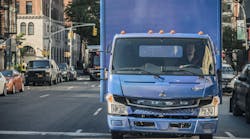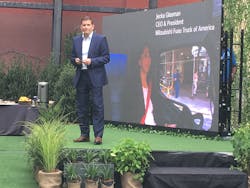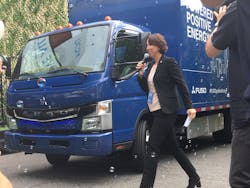NEW YORK, NY. Construction clanking, sirens from emergency vehicles, and other typical city traffic noise served as the backdrop for Thursday’s global launch of Mitsubishi Fuso’s medium-duty electric delivery truck here in New York City’s East Village.
The truck, called the eCanter, was unveiled by Mitsubishi Fuso Truck and Bus Corporation (MFTBC), part of Daimler Trucks, and has been touted as a zero-emission, zero-noise truck that will help transform urban areas, like New York City, “into cleaner and quieter places for everyday deliveries.” The truck, driven through the city by Fuso president and CEO Jecka Glasman, made its entrance at the corner of Lafayette and Great Jones, where Fuso converted an old gas station into its temporary “Energy Station of the Future.”
Introducing the truck, Marc Llistosella, president and CEO of MFTBC and head of Daimler Trucks Asia, said some of the main trends he’s seen that will have major impacts on the trucking and bus industries are urbanization, emissions reduction, and energy efficiency.
“We have been seeing more and more renewable, clean energy,” Llistosella explained. “There were a lot of hesitations and resistance, but now I would say [electrification] is coming.”
Llistosella noted that 54% of the world’s population lives in cities, which has become a main driver for electrification and the need for clean trucks and buses.
“Cities have a voice,” he noted. “It’s clear they want less pollution, less emissions and much less noise. We see a lot of tendencies and strong statements – from cities like Paris – that from 2040 on, they will no longer allow combustion-engine vehicles and trucks allowed into the cities. We will see changes driven by the cities.”
One diesel-engine truck produces roughly 16 tons of CO2 in New York City, Llistosella explained. Assuming there are 10,000 trucks driving around Manhattan a year, they would emit 160,000 tons of CO2 a year, plus NOx emissions, and noise, he added. To offset that pollution, New York would need a forest the size of 36 Central Parks.
New York City has put in place a plan to reduce emissions by 80% by 2050. Glasman added Fuso believes this truck is a “game-changer” for the city.
“It will allow us cleaner, quieter, more efficient delivery systems to the people who live in New York,” she stated. “We expect to have 50 trucks that will be operating here in the U.S. by the end of the year.”
The eCanter will be delivered to customers starting this year in the U.S., Europe and Japan. MFTBC noted it is planning to deliver 500 units of this generation to customers within the next two years. Larger scale production is intended to start in 2019.
The eCanter has a range of more than 60 miles and a load capacity up to three and a half tons – depending on body and usage. The vehicle’s electric powertrain contains six high voltage lithium ion battery packs with 420 V and 13.8 kWh each. According to the company, when comparing the eCanter to a conventional diesel truck, it offers savings up to $2,000 per 10,000 miles on operating costs.
At its global launch, Fuso also announced that UPS is the company’s first U.S. commercial partner for the eCanter. UPS said it will place in service trucks to build on UPS’s Rolling Laboratory fleet of more than 8,500 alternative fuel and advanced technology vehicles.
“At UPS, we constantly evaluate and deploy advanced technologies that enable sustainable, innovative solutions for our fleet,” said Carlton Rose, president, global fleet maintenance & engineering, UPS. “Electric trucks make our fleet both cleaner and quieter. We have a long-standing global relationship with Daimler, and we welcome the opportunity to trial the Fuso eCanter as UPS continues to realize the benefits of electric trucks.”
In coordination with the office of New York Attorney General Eric Schneiderman, Fuso also will supply a fleet of eCanter trucks to nonprofits, including Wildlife Conservation Society, New York Botanical Garden, Habitat for Humanity New York City, and Big Reuse Brooklyn.






